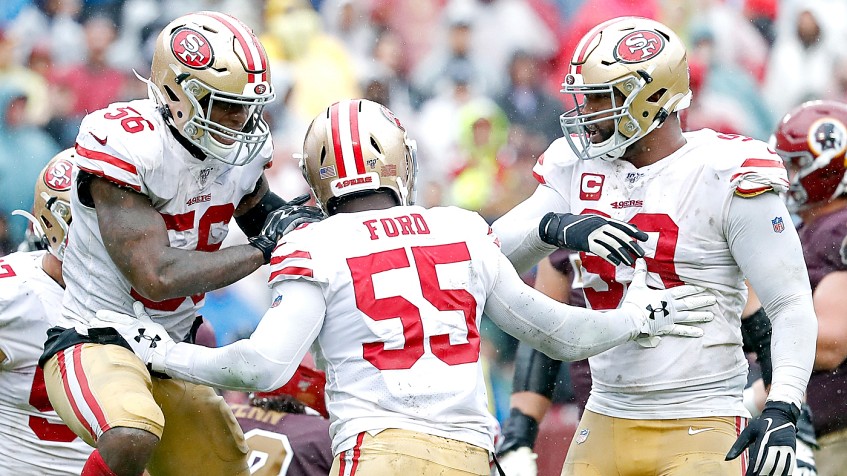Clearly, the 49ers brass recognized and attempted to address the lack of a pass rush over the past offseason, as they drafted Nick Bosa second overall and invested significant capital (both draft and financial) by trading a second-round pick for Dee Ford and extending him with a lucrative contract.
The team's investment paid dividends early in the season, as a dominant 49ers defense led the team to an 8-0 start as the offense struggled at times to find its rhythm through some shaky performances by Jimmy Garoppolo. Through its Week 12 game against Green Bay, the 49ers defense accumulated 44 sacks on 324 dropbacks, for an impressive sack rate of 13.5%. In its final five games, however, that number has plummeted. The defense has collected only five sacks combined on 188 dropbacks, for a middling sack rate of just 2.7%.
Why the dramatic decline?
Luckily for the 49ers, the answer can be found in a player (hopefully) slated to make his return this week against Minnesota. Ford injured his hamstring in Week 11 against the Cardinals and has played only four snaps since, almost exactly coinciding with the drop off in productivity of the 49ers pass rush.
Ford himself only has 6.5 sacks on the season, so at first glance, losing him shouldn't have this profound of an impact. His presence, however, allows all the other pieces on the defensive front to slot into roles they can excel at.
The 49ers don't really have an effective backup edge rusher on their roster, as they've failed to find one either in the draft or by taking flyers on veteran free agents. With Ford sidelined, the 49ers have compensated by moving defensive tackle Arik Armstead to left end on passing downs. Armstead is a much more natural defensive tackle, where he's able to use his enormous reach advantage (Armstead is listed at 6'7″) and heavy hands to manhandle shorter interior linemen, especially when rushing the passer.
When playing on the outside, however, Armstead's reach advantage is mitigated by facing opposing tackles, who are generally taller with longer arms than interior linemen. Armstead's stats show starkly how much more effective he is on the inside. Through the Week 12 game against Green Bay, a resurgent Armstead had 10 sacks on the season. He hasn't recorded one since.
Moving Armstead outside also necessarily means the 49ers backup defensive tackles see more snaps, and injuries and ineffectiveness have racked that group. With the criminally underrated D.J Jones out for the season, Jullian Taylor (since injured as well) and Soloman Thomas have received more playing time. Both are serviceable players against the run, but neither has the dynamic pass rush ability that Armstead and fellow stud tackle DeForest Buckner have. Thomas played over 60% of the team's defensive snaps in Weeks 15 and 16 despite cracking 50% just once before that, and still only has two sacks on the year.
Losing Ford is like losing two players — an outside speed rusher (Ford) and a dominant interior player in Armstead, who is forced to move to a role in which he's far less effective. It wouldn't be a surprise at all to see the 49ers try to add another edge rusher this offseason even though they already have two great young players at the position in Ford and Bosa.
If anyone needs justification for why Ford got the enormous contract extension he did, look no further than the impact his absence had. With Ford on the field, the 49ers have one of the most fearsome pass rushes in the entire NFL. Without him, they barely have one at all.
* All stats are courtesy of pro-football-reference.com
More San Francisco 49ers News
-
Why Baldy loves new 49ers pass rusher Mykel Williams
NFL analyst Brian Baldinger joined Bay Area radio station 95.7 The Game on Friday morning to discuss the San Francisco 49ers' first-round selection of Georgia defensive end Mykel Williams. Baldinger is a big fan of the pick, calling Williams the clear second-best edge defender... -
John Lynch explains why the 49ers waited until late to address the O-line
Heading into the 2025 NFL Draft, the offensive line was considered one of the San Francisco 49ers' most pressing needs, with many mock drafts even projecting an offensive lineman at the 11th overall pick. While the 49ers did select an offensive lineman, they didn't do so until... -
Why 49ers believe Jordan Watkins is the 'whole package'
Jordan Watkins made a strong enough impression on Kyle Shanahan to earn a fourth-round selection by the San Francisco 49ers. With Deebo Samuel gone and Brandon Aiyuk recovering from an injury that could sideline him at the start of the 2025 season, Watkins will have even more... -
Rich Eisen on why 49ers need to deliver huge Brock Purdy payday
On Tuesday, the San Francisco 49ers crossed off a major item from their offseason to-do list, signing All-Pro tight end George Kittle to a four-year, $76.4 million contract extension. The next big item on the list is locking down quarterback Brock Purdy. However, that deal will...
